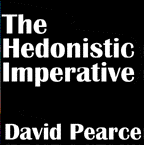







4. Objections.
No 23
This worry shouldn't be lightly dismissed. But perhaps three points are in order.
First, natural selection has promoted such an abundance of dreadful states that even a severely sub-optimal (by who's criteria? - presumably not the sublimely fulfilled super- beings themselves) result would ethically be far preferable to the status quo; and indeed preferable to any of our often hellish world's environmentally tweaked successors.
Second, the danger of getting irreversibly stuck is still present even if genetic engineering and psychopharmacology are renounced in favour of time-honoured "peripheralist" approaches to making the world a better place. In fact, for what it's worth, psychoactive drugs potentially offer a form of "simulated annealing", in neural networks-speak, enabling us to escape from local minima - though sometimes the jolt may be too uncontrollably violent and even dangerous commonly to be useful e.g. taking psychedelic agents such as lysergic acid diethylamide (LSD), ketamine or DMT.
Third, the idea that the project sketched in HI would more readily lead to us getting "stuck" stems, I think, from its conflation with one or both of its two immediate intellectual antecedents of which I'm consciously aware - either opiated-style quiescence à la Brave New World or the endless and uncontrollably orgasmic lever- pressing frenzy of a rat-/human-driven pleasure-machine. One consequence of enhancing dopamine function in the manner stressed in HI, however, is that not merely is overall motivation deepened, but also the range of different activities one finds rewarding is increased (cf. the recent excitement over finding the D4 "novelty- loving" gene). Consequently the likelihood of an organism, or a species, getting stuck in rut is diminished, though certainly not eliminated, by a strategy which incorporates boosting key receptor sub-types of dopamine-mediated process. It's worth noting that there is an experimentally demonstrable tendency of anti-dopaminergic mood-darkeners- and -flatteners like the D2-blocking major tranquillisers to reduce incentive-motivation and novelty-seeking behaviour. Analogously, most Dark Age humans stuck on a hedonic treadmill way down in the historical abyss don't realise just how trapped we are.
On the other hand, there's a sense in which getting generically "stuck" in paradise is precisely what some of us are after.
E-mail Dave : dave@hedweb.com